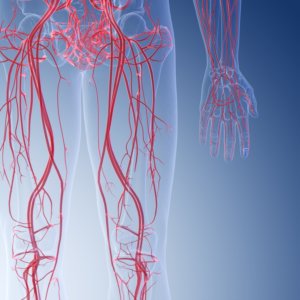 Colon polyps are rather common, and there is a specific type of polyps that increases the risk of colon cancer, which is also a widespread problem. According to a new clinical study from the University of Leeds in England, a concentrated form of the omega-3 fatty acid, EPA, which is found in oily fish and fish oil supplements, helps reduce the number of colon polyps. The same is the case with aspirin. The two preparations work differently, however, depending on where in the colon the polyps are found, and aspirin may have long-term side effects. Earlier research has shown that supplements of selenium and antioxidants have a preventive effect, which appears to be even greater.
Colon polyps are rather common, and there is a specific type of polyps that increases the risk of colon cancer, which is also a widespread problem. According to a new clinical study from the University of Leeds in England, a concentrated form of the omega-3 fatty acid, EPA, which is found in oily fish and fish oil supplements, helps reduce the number of colon polyps. The same is the case with aspirin. The two preparations work differently, however, depending on where in the colon the polyps are found, and aspirin may have long-term side effects. Earlier research has shown that supplements of selenium and antioxidants have a preventive effect, which appears to be even greater.
 The majority of chronic ailments, including autoimmune diseases like rheumatoid arthritis, depression, Alzheimer’s disease, diabetes, and cancer, involve inflammation. Science has known for a long time that omega-3 fatty acids counteract inflammation. A study from the University of Illinois, USA, shows that the process is controlled by cannabinoids, which the body itself can produce but are also found in cannabis oil. In other words, it is possible to activate the body’s cannabinoid receptors in the immune system and nervous system by means of large quantities of fish oil, which contains the most active forms of omega-3.
The majority of chronic ailments, including autoimmune diseases like rheumatoid arthritis, depression, Alzheimer’s disease, diabetes, and cancer, involve inflammation. Science has known for a long time that omega-3 fatty acids counteract inflammation. A study from the University of Illinois, USA, shows that the process is controlled by cannabinoids, which the body itself can produce but are also found in cannabis oil. In other words, it is possible to activate the body’s cannabinoid receptors in the immune system and nervous system by means of large quantities of fish oil, which contains the most active forms of omega-3.
- and help prevent dementia, depression, and impairment of your cognitive skills
 People with elevated levels of omega-3 fatty acids in their blood have better circulation in those parts of the brain that handle learning, language, memory, and other cognitive functions, according to a recent report that is published in the Journal of Alzheimer’s Disease. The scientists also observed a link between blood levels of omega-3 and the rate of dementia and depression. They call their study an important discovery that supports earlier studies, which have shown how simple dietary adjustments such as increasing your intake of oily fish or fish oil supplements help preserve mental skills and a healthy mind.
People with elevated levels of omega-3 fatty acids in their blood have better circulation in those parts of the brain that handle learning, language, memory, and other cognitive functions, according to a recent report that is published in the Journal of Alzheimer’s Disease. The scientists also observed a link between blood levels of omega-3 and the rate of dementia and depression. They call their study an important discovery that supports earlier studies, which have shown how simple dietary adjustments such as increasing your intake of oily fish or fish oil supplements help preserve mental skills and a healthy mind.
 It is commonly known that oily fish and fish oil supplements contain the two omega-3 fatty acids EPA and DHA that are good for the brain. Now, scientists from Singapore have discovered a special omega-3 fatty acid that is of particular importance to brain cells that are surrounded by a protective myeline sheath. The scientists say that their discovery may help prevent brain ageing and lead to the development of new therapies aimed at treating neurological disorders like sclerosis that are associated with myelin damage. Their new study is published in Journal of Clinical Investigation and it appears that fish roe is the best source of these special omega-3 fatty acids that are needed to stimulate the myeline sheath.
It is commonly known that oily fish and fish oil supplements contain the two omega-3 fatty acids EPA and DHA that are good for the brain. Now, scientists from Singapore have discovered a special omega-3 fatty acid that is of particular importance to brain cells that are surrounded by a protective myeline sheath. The scientists say that their discovery may help prevent brain ageing and lead to the development of new therapies aimed at treating neurological disorders like sclerosis that are associated with myelin damage. Their new study is published in Journal of Clinical Investigation and it appears that fish roe is the best source of these special omega-3 fatty acids that are needed to stimulate the myeline sheath.
 Alzheimer’s is an insidious disease and the leading cause of dementia. It’s also one of the major causes of death in old age. Diet plays a major role in preventing the disease. In fact, having high concentrations of the omega-3fatty acid, DHA, in the blood can halve the risk of developing Alzheimer’s disease, according to a study that is published in Nutrients. DHA (docosahexaenoic acid) is found in oily fish and fish oil supplements. This essential fatty acid is also found in all our cell membranes (including nerve cells) and plays a key role in maintaining our general health and cognitive skills. Unfortunately, modern diets contain far too little omega-3, but science is not quite sure how much we need.
Alzheimer’s is an insidious disease and the leading cause of dementia. It’s also one of the major causes of death in old age. Diet plays a major role in preventing the disease. In fact, having high concentrations of the omega-3fatty acid, DHA, in the blood can halve the risk of developing Alzheimer’s disease, according to a study that is published in Nutrients. DHA (docosahexaenoic acid) is found in oily fish and fish oil supplements. This essential fatty acid is also found in all our cell membranes (including nerve cells) and plays a key role in maintaining our general health and cognitive skills. Unfortunately, modern diets contain far too little omega-3, but science is not quite sure how much we need.
- intake that also reduces their need for medicine
 An estimated 334 million people worldwide suffer from asthma, which is associated with chronic inflammation. Increased intake of omega-3 fatty acids may help prevent the disease and improve therapies by reducing inflammation in the upper respiratory tract. Also, omega-3 reduces the need for corticosteroids and other types of asthma medicine. In fact, the diet plays a vital role in the development of asthma, and overweight individuals seem to benefit particularly much from an increased omega-3 intake, according to a study that is published in Nutrients. But how much omega-3 does it take to inhibit inflammation, and why are oily fish and fish oil supplements better sources?
An estimated 334 million people worldwide suffer from asthma, which is associated with chronic inflammation. Increased intake of omega-3 fatty acids may help prevent the disease and improve therapies by reducing inflammation in the upper respiratory tract. Also, omega-3 reduces the need for corticosteroids and other types of asthma medicine. In fact, the diet plays a vital role in the development of asthma, and overweight individuals seem to benefit particularly much from an increased omega-3 intake, according to a study that is published in Nutrients. But how much omega-3 does it take to inhibit inflammation, and why are oily fish and fish oil supplements better sources?
 Apparently so. Omega-3 is a class of essential fatty acids with a host of different functions in the body. We primarily get omega-3 from oily fish but it is also found in certain other foods. Our intake of omega-3 has been reduced substantially as a result of altered diets and the use of unnatural animal feed. It appears that having more omega-3 in the blood can help us live longer. This was shown in a study that is published in American Journal of Clinical Nutrition. The question is how do we get enough omega-3?
Apparently so. Omega-3 is a class of essential fatty acids with a host of different functions in the body. We primarily get omega-3 from oily fish but it is also found in certain other foods. Our intake of omega-3 has been reduced substantially as a result of altered diets and the use of unnatural animal feed. It appears that having more omega-3 in the blood can help us live longer. This was shown in a study that is published in American Journal of Clinical Nutrition. The question is how do we get enough omega-3?
 Omega-3and omega-6 fatty acids are vital for our brain function, nervous system, and immune defense but small children get too little of these two essential fatty acids. According to a Canadian study, this increases their risk of chronic inflammation and chronic diseases. The intake of omega-3 from oily fish and shellfish is particularly limited. For children who dislike seafood, a fish oil supplement is worth considering for the sake of their health and development.
Omega-3and omega-6 fatty acids are vital for our brain function, nervous system, and immune defense but small children get too little of these two essential fatty acids. According to a Canadian study, this increases their risk of chronic inflammation and chronic diseases. The intake of omega-3 from oily fish and shellfish is particularly limited. For children who dislike seafood, a fish oil supplement is worth considering for the sake of their health and development.
 According to a pilot study from Los Angeles, patients with higher blood levels of omega-3fatty acids in their blood are 75 percent less likely to die from a COVID-19 infection. The scientists behind the study assume it is because of the anti-inflammatory properties of the omega-3 fatty acids and their ability to regulate the immune defense, which is often completely derailed in serious cases of COVID-19. The scientists also mention other nutrients with anti-inflammatory properties.
According to a pilot study from Los Angeles, patients with higher blood levels of omega-3fatty acids in their blood are 75 percent less likely to die from a COVID-19 infection. The scientists behind the study assume it is because of the anti-inflammatory properties of the omega-3 fatty acids and their ability to regulate the immune defense, which is often completely derailed in serious cases of COVID-19. The scientists also mention other nutrients with anti-inflammatory properties.
 Oily fish and fish oil have a high content of the two omega-3 fatty acids, EPA (eicosapentaenoic acid) and DHA (docosahexaenoic acid), that are important for our brain, nervous system, intelligence, and mental health. Modern diets, however, are to blame for our lack of omega-3. A team of scientists from England has found that supplementation with EPA-rich fish oil for 26 weeks improves mental acuity and reaction time in healthy, young adults. This was not the case with DHA-rich oil fish oil, on the other hand. The scientists were surprised to find that EPA is more important than DHA for these cognitive skills.
Oily fish and fish oil have a high content of the two omega-3 fatty acids, EPA (eicosapentaenoic acid) and DHA (docosahexaenoic acid), that are important for our brain, nervous system, intelligence, and mental health. Modern diets, however, are to blame for our lack of omega-3. A team of scientists from England has found that supplementation with EPA-rich fish oil for 26 weeks improves mental acuity and reaction time in healthy, young adults. This was not the case with DHA-rich oil fish oil, on the other hand. The scientists were surprised to find that EPA is more important than DHA for these cognitive skills.
 Oily fish and fish oil contain the long-chained omega-3 fatty acids, EPA and DHA, that are of vital importance to the brain, the nervous system, and our mental health throughout life. Today, most people on a global scale lack these omega-3 fatty acids because of altered dietary habits, including the use of unnatural animal fodder. Low intake of omega-3 increases the risk of various ailments such as ADHD, autism, depression, borderline personality disorder (BPD), and bipolar disorder. Fish oil supplementation may therefore offer promise as prevention and part of the therapy used to treat a number of these disorders. The problem with modern diets is their disproportionate content of omega-6 at the expense of omega-3, an imbalance that may derail a number of physiological functions of importance to our mental health, according to a review article published in the science journal, Nutrients.
Oily fish and fish oil contain the long-chained omega-3 fatty acids, EPA and DHA, that are of vital importance to the brain, the nervous system, and our mental health throughout life. Today, most people on a global scale lack these omega-3 fatty acids because of altered dietary habits, including the use of unnatural animal fodder. Low intake of omega-3 increases the risk of various ailments such as ADHD, autism, depression, borderline personality disorder (BPD), and bipolar disorder. Fish oil supplementation may therefore offer promise as prevention and part of the therapy used to treat a number of these disorders. The problem with modern diets is their disproportionate content of omega-6 at the expense of omega-3, an imbalance that may derail a number of physiological functions of importance to our mental health, according to a review article published in the science journal, Nutrients.
 Non-alcoholic fatty liver disease (NAFLD) that is linked to overweight and type 2 diabetes may eventually cause critical liver inflammation, liver fibrosis, and liver cancer. The diet plays a major role, and scientists from Oregon State University have observed that the omega-3 fatty acids that we get from oily fish are able to fight this harmful liver condition. This has enormous therapeutic value because there are currently no available therapies. It is also important to avoid altogether or limit your intake of refined carbohydrates and refined omega-6 fatty acids from plant oil.
Non-alcoholic fatty liver disease (NAFLD) that is linked to overweight and type 2 diabetes may eventually cause critical liver inflammation, liver fibrosis, and liver cancer. The diet plays a major role, and scientists from Oregon State University have observed that the omega-3 fatty acids that we get from oily fish are able to fight this harmful liver condition. This has enormous therapeutic value because there are currently no available therapies. It is also important to avoid altogether or limit your intake of refined carbohydrates and refined omega-6 fatty acids from plant oil.
 The rate of autism and ADHD has exploded over the past decades, and the problem comes with an enormous human and socio-economic price tag. A study from the University of Copenhagen has shown that fish oil helps adults with autism and ADHD by improving their attention and working memory. In the study that is published in British Journal of Nutrition, the scientists look closer at omega-3 fatty acids in fish oil and their vital role in the brain and nervous system.
The rate of autism and ADHD has exploded over the past decades, and the problem comes with an enormous human and socio-economic price tag. A study from the University of Copenhagen has shown that fish oil helps adults with autism and ADHD by improving their attention and working memory. In the study that is published in British Journal of Nutrition, the scientists look closer at omega-3 fatty acids in fish oil and their vital role in the brain and nervous system.
 Fish oil contains EPA and DHA, two omega-3 fatty acids with a number of different functions in the brain and nervous system. It appears that middle-aged people who consume more oily fish or who take fish oil supplements have improvements in their brain structure and cognitive skills. This was shown in a study that is published in Neurology. The study results are quite interesting because cognitive decline and dementia are increasing problems that affect millions of people worldwide. The study supports previous research where it was seen that having higher concentrations of DHA in the red blood cell can reduce the risk of Alzheimer’s disease by 50 percent.
Fish oil contains EPA and DHA, two omega-3 fatty acids with a number of different functions in the brain and nervous system. It appears that middle-aged people who consume more oily fish or who take fish oil supplements have improvements in their brain structure and cognitive skills. This was shown in a study that is published in Neurology. The study results are quite interesting because cognitive decline and dementia are increasing problems that affect millions of people worldwide. The study supports previous research where it was seen that having higher concentrations of DHA in the red blood cell can reduce the risk of Alzheimer’s disease by 50 percent.
 Menopause is typically linked to hormonal changes that increase the risk of aching joints, overweight, cardiovascular disease, muscle weakness, and metabolic disturbances. According to a study published in Nutrients, however, high-dosed supplementation with fish oil for eight weeks has a positive effect on blood pressure, muscle strength, chronic inflammation, and oxidative stress, which can otherwise set the stage for atherosclerosis, joint pain, and number of chronic ailments. Earlier research has also demonstrated that fish oil supplements help against dry mucous membranes and depression that are often caused by brain inflammation.
Menopause is typically linked to hormonal changes that increase the risk of aching joints, overweight, cardiovascular disease, muscle weakness, and metabolic disturbances. According to a study published in Nutrients, however, high-dosed supplementation with fish oil for eight weeks has a positive effect on blood pressure, muscle strength, chronic inflammation, and oxidative stress, which can otherwise set the stage for atherosclerosis, joint pain, and number of chronic ailments. Earlier research has also demonstrated that fish oil supplements help against dry mucous membranes and depression that are often caused by brain inflammation.
– and the amount you consume matters
 Fish oil contains the long-chained omega-3fatty acids, EPA and DHA, that have a number of essential functions. Although it has been known for decades that fish oil lowers the risk of cardiovascular disease and early death, study results have been conflicting. Now, a large British population study of over 400,000 people confirms that regular consumption of fish oil supplements has a positive effect on the cardiovascular system and contributes to improved quality of longevity. The scientists also address that the quantity of fish oil may be determining for your health.
Fish oil contains the long-chained omega-3fatty acids, EPA and DHA, that have a number of essential functions. Although it has been known for decades that fish oil lowers the risk of cardiovascular disease and early death, study results have been conflicting. Now, a large British population study of over 400,000 people confirms that regular consumption of fish oil supplements has a positive effect on the cardiovascular system and contributes to improved quality of longevity. The scientists also address that the quantity of fish oil may be determining for your health.
 Depression is often caused by brain inflammation, and it looks as if high-dosed supplementation with EPA, a type of omega-3 fatty acids found in fish oil, may help as it reduces depression in patients with elevated inflammation markers in the blood. This was shown in a study that is published in The Journal of Clinical Psychiatry.
Depression is often caused by brain inflammation, and it looks as if high-dosed supplementation with EPA, a type of omega-3 fatty acids found in fish oil, may help as it reduces depression in patients with elevated inflammation markers in the blood. This was shown in a study that is published in The Journal of Clinical Psychiatry.
- and being overweight poses a particular risk
 Premature delivery increases the baby’s risk of being born with developmental disturbances or dying within its first months of life. It is commonly known that omega-3 fatty acids are important for normal pregnancy. According to a new and updated Cochrane review article, overweight people are at increased risk of lacking omega-3 fatty acids, and supplementing with omega-3 may lower their risk of giving birth too soon. Although the new study supports earlier research, there was something that surprised the scientists.
Premature delivery increases the baby’s risk of being born with developmental disturbances or dying within its first months of life. It is commonly known that omega-3 fatty acids are important for normal pregnancy. According to a new and updated Cochrane review article, overweight people are at increased risk of lacking omega-3 fatty acids, and supplementing with omega-3 may lower their risk of giving birth too soon. Although the new study supports earlier research, there was something that surprised the scientists.
 A well-functioning memory is vital for our quality of life. With the increasing number of seniors, however, the dementia rate is on an incline. According to a study that is published in Clinical Nutrition, it looks as if a combination of fish oil and antioxidants such as lutein and zeaxanthin may improve memory in elderly seniors. You can support your brain and memory on a daily basis by eating oily fish or fish oil supplements together with antioxidants from foods such as cabbage, spinach and other leafy greens, and eggs. Another important antioxidant is mezo-zeaxanthin that is found in certain fish and in fish skin.
A well-functioning memory is vital for our quality of life. With the increasing number of seniors, however, the dementia rate is on an incline. According to a study that is published in Clinical Nutrition, it looks as if a combination of fish oil and antioxidants such as lutein and zeaxanthin may improve memory in elderly seniors. You can support your brain and memory on a daily basis by eating oily fish or fish oil supplements together with antioxidants from foods such as cabbage, spinach and other leafy greens, and eggs. Another important antioxidant is mezo-zeaxanthin that is found in certain fish and in fish skin.
- and help prevent atherosclerosis
 On a global scale, atherosclerosis is the leading cause of death due to heart failure or stroke. Atherosclerosis causes symptoms such as breathing difficulty, calf pain,impotence, and poor memory as a result of organs and tissues not getting enough blood and oxygen. Because the condition develops slowly and many people are not even aware of its presence before it is too late, early prevention is vital. According to a study that is published in the science journal Circulation, four grams of fish oil daily can lower levels of triglycerides, a blood lipid that is considered to be more harmful than cholesterol. It is also important to address the indirect causes of elevated triglyceride levels such as overweight, metabolic syndrome and type 2 diabetes. Consuming too many carbohydrates may even cause fatty liver and result in excess triglyceride production. On the other hand, triglycerides also have health properties, which we will take a closer look at for clarity.
On a global scale, atherosclerosis is the leading cause of death due to heart failure or stroke. Atherosclerosis causes symptoms such as breathing difficulty, calf pain,impotence, and poor memory as a result of organs and tissues not getting enough blood and oxygen. Because the condition develops slowly and many people are not even aware of its presence before it is too late, early prevention is vital. According to a study that is published in the science journal Circulation, four grams of fish oil daily can lower levels of triglycerides, a blood lipid that is considered to be more harmful than cholesterol. It is also important to address the indirect causes of elevated triglyceride levels such as overweight, metabolic syndrome and type 2 diabetes. Consuming too many carbohydrates may even cause fatty liver and result in excess triglyceride production. On the other hand, triglycerides also have health properties, which we will take a closer look at for clarity.
 Heart failure affects millions of people worldwide and many die within the first year of being hospitalized with acute heart failure. However, eating a diet that is rich in the omega-3 fatty acid EPA from oily fish and ALA from plant foods such as walnuts is linked to a lower risk of blood clots and early death, according to a new study that is published in Journal of the American College of Cardiology. You can also read more about another compound that improves cardiac function and survival after acute heart failure.
Heart failure affects millions of people worldwide and many die within the first year of being hospitalized with acute heart failure. However, eating a diet that is rich in the omega-3 fatty acid EPA from oily fish and ALA from plant foods such as walnuts is linked to a lower risk of blood clots and early death, according to a new study that is published in Journal of the American College of Cardiology. You can also read more about another compound that improves cardiac function and survival after acute heart failure.
 If you consume too much red meat it may increase your risk of colon cancer, but is there meat with the opposite effect? According to a new and groundbreaking study, eating salmon or other good sources of omega-3 fatty acids appears to help prevent this rather common cancer form and possibly even other cancers, as well. Just make sure not to get too much omega-6, especially from margarine and other plant oils, as it is vital to have the correct balance between the two types of fatty acids.
If you consume too much red meat it may increase your risk of colon cancer, but is there meat with the opposite effect? According to a new and groundbreaking study, eating salmon or other good sources of omega-3 fatty acids appears to help prevent this rather common cancer form and possibly even other cancers, as well. Just make sure not to get too much omega-6, especially from margarine and other plant oils, as it is vital to have the correct balance between the two types of fatty acids.
 As we grow older, our risk of hearing loss increases, and our diet plays a major role. Apparently, there is a link between hearing loss and being deficient in an omega-3 fatty acid that we get from oily fish and fish oil supplements. This was seen in a study that was presented in Boston at a meeting for the American Society for Nutrition – an American company for professional researchers and practitioners in nutrition. The scientists mention that increased intake of this particular omega-3 fatty acid from the diet or from supplements may help prevent hearing loss.
As we grow older, our risk of hearing loss increases, and our diet plays a major role. Apparently, there is a link between hearing loss and being deficient in an omega-3 fatty acid that we get from oily fish and fish oil supplements. This was seen in a study that was presented in Boston at a meeting for the American Society for Nutrition – an American company for professional researchers and practitioners in nutrition. The scientists mention that increased intake of this particular omega-3 fatty acid from the diet or from supplements may help prevent hearing loss.
 According to a new English study, increased intake of omega-3 fatty acids during the childhood years may lower your risk of developing asthma later in life but only if you have a specific gene variation. In addition, a previous Australian study reports that lower blood levels of omega-3 fatty acids in adults is associated with poorer asthma control. Diet generally seems to play a major role in the development of the disease and overweight individuals appear to benefit more than others from increasing their omega-3 intake. The big question is how much do they need to take?
According to a new English study, increased intake of omega-3 fatty acids during the childhood years may lower your risk of developing asthma later in life but only if you have a specific gene variation. In addition, a previous Australian study reports that lower blood levels of omega-3 fatty acids in adults is associated with poorer asthma control. Diet generally seems to play a major role in the development of the disease and overweight individuals appear to benefit more than others from increasing their omega-3 intake. The big question is how much do they need to take?
 Oily fish and fish oil supplements contain EPA and DHA, two types of omega-3 fatty acids that are important for our brain, nervous system, and mental health throughout life. According to a new Irish study, young adults with higher blood levels of omega-3are less likely to develop depression and anxiety. The researchers see a huge therapeutic potential in advising people to increase their omega-3 intake from oily fish or supplements. The problem is that modern diets contain far too little omega-3 and too much omega-6, which contributes to the increased rate of mental illness.
Oily fish and fish oil supplements contain EPA and DHA, two types of omega-3 fatty acids that are important for our brain, nervous system, and mental health throughout life. According to a new Irish study, young adults with higher blood levels of omega-3are less likely to develop depression and anxiety. The researchers see a huge therapeutic potential in advising people to increase their omega-3 intake from oily fish or supplements. The problem is that modern diets contain far too little omega-3 and too much omega-6, which contributes to the increased rate of mental illness.
 Migraine is a common neurological disease that reduces quality of life and results in many sick days. Migraine medication does not work for everyone and many people have adverse effects, so it makes more sense to focus on prevention. A new American study shows that diets with higher levels of omega-3 fatty acids from oily fish can reduce the frequency of migraines compared with eating an average diet. People who dislike the taste of fish can take a high-quality fish oil supplement, instead.
Migraine is a common neurological disease that reduces quality of life and results in many sick days. Migraine medication does not work for everyone and many people have adverse effects, so it makes more sense to focus on prevention. A new American study shows that diets with higher levels of omega-3 fatty acids from oily fish can reduce the frequency of migraines compared with eating an average diet. People who dislike the taste of fish can take a high-quality fish oil supplement, instead.
 People who suffer from dry eyes have reduced tear production. The condition has become increasingly common because of all the hours we spend staring at screens from devices like smartphones, computers, tablets etc. Dry eyes are irritated, and the problem may cause damage to both your eyes and eyesight. However, a team of scientists from the Hokkaido University in Japan has demonstrated that healthy fats such as omega-3 are able to protect the eyes and repair damage. You can also find other useful tips on natural ways to prevent and treat dry eyes.
People who suffer from dry eyes have reduced tear production. The condition has become increasingly common because of all the hours we spend staring at screens from devices like smartphones, computers, tablets etc. Dry eyes are irritated, and the problem may cause damage to both your eyes and eyesight. However, a team of scientists from the Hokkaido University in Japan has demonstrated that healthy fats such as omega-3 are able to protect the eyes and repair damage. You can also find other useful tips on natural ways to prevent and treat dry eyes.
 Lung fibrosis is a condition characterized by accelerating scarring of lung tissue, which impairs breathing, reduces the oxygen level in the blood, and lowers the cellular energy turnover. Some types of lung fibrosis are very aggressive and there is currently no cure. Healthy omega-3 fatty acids from oily fish and fish oil supplements may delay the progression of the disease and postpone the immediate need for lung transplants, according to a study that is published in the journal CHEST.
Lung fibrosis is a condition characterized by accelerating scarring of lung tissue, which impairs breathing, reduces the oxygen level in the blood, and lowers the cellular energy turnover. Some types of lung fibrosis are very aggressive and there is currently no cure. Healthy omega-3 fatty acids from oily fish and fish oil supplements may delay the progression of the disease and postpone the immediate need for lung transplants, according to a study that is published in the journal CHEST.
- while omega-6 can aggravate the disease
 Omega-3 and omega-6 fatty acids in our diet have opposite effects on the severity of asthma in vulnerable children. Omega-3 appears to reduce the severity of asthma symptoms, while omega-6 seems to make the symptoms worse, according to an article published in the American Journal of Respiratory and Clinical Care Medicine. The problem with modern diets is that they tend to contain far too little omega-3 and far too much omega-6. However, this is something one can correct with help from dietary changes and fish oil supplements.
Omega-3 and omega-6 fatty acids in our diet have opposite effects on the severity of asthma in vulnerable children. Omega-3 appears to reduce the severity of asthma symptoms, while omega-6 seems to make the symptoms worse, according to an article published in the American Journal of Respiratory and Clinical Care Medicine. The problem with modern diets is that they tend to contain far too little omega-3 and far too much omega-6. However, this is something one can correct with help from dietary changes and fish oil supplements.
 Contact sports like football and boxing are associated with frequent blows to the head that can cause physical traumas and long-term effects. However, a new study that is published in Journal of the International Society of Sports Nutrition suggests that high-dosed supplements of omega-3 fatty acids can protect against the damage caused by head traumas in American football. There is even a positive effect on cardiovascular health and joints. Excessive training and high performance sport can also increase the risk of oxidative stress that is linked to acute injury, inflammation, and subsequent development of neurological disease. It is therefore also important to get plenty of antioxidants like vitamins A, C, and E plus selenium and zinc if you engage in sport at a high level.
Contact sports like football and boxing are associated with frequent blows to the head that can cause physical traumas and long-term effects. However, a new study that is published in Journal of the International Society of Sports Nutrition suggests that high-dosed supplements of omega-3 fatty acids can protect against the damage caused by head traumas in American football. There is even a positive effect on cardiovascular health and joints. Excessive training and high performance sport can also increase the risk of oxidative stress that is linked to acute injury, inflammation, and subsequent development of neurological disease. It is therefore also important to get plenty of antioxidants like vitamins A, C, and E plus selenium and zinc if you engage in sport at a high level.
 More and more studies show how important our digestion and gut flora are for our health and mood. A new study published in Scientific Reports reveals that omega-3 fatty acids are able to influence positively the diversity of our gut flora.
More and more studies show how important our digestion and gut flora are for our health and mood. A new study published in Scientific Reports reveals that omega-3 fatty acids are able to influence positively the diversity of our gut flora.
 Elevated blood pressure, a problem many people have without knowing it, is the major cause of early death. Our lifestyle and what we eat play an enormous role and according to a new meta-analysis that is published in Journal of the American Heart Association, daily intake of three grams of omega-3 fatty acids can reduce your blood pressure. It is possible to get this amount of omega-3by consuming a serving of oily fish like herring or taking a high-quality fish oil supplement.
Elevated blood pressure, a problem many people have without knowing it, is the major cause of early death. Our lifestyle and what we eat play an enormous role and according to a new meta-analysis that is published in Journal of the American Heart Association, daily intake of three grams of omega-3 fatty acids can reduce your blood pressure. It is possible to get this amount of omega-3by consuming a serving of oily fish like herring or taking a high-quality fish oil supplement.
 Schizophrenia is a serious psychotic condition with delusions and hallucinations, which can be very taxing for the sufferer as well as for the rest of the family. Most people experience a slow and gradual worsening of the brain ailment, and the disease may even spread to other organs. On average, people who suffer from schizophrenia die 10 years earlier than the general population, which is why it is vital to prevent the disease or ameliorate its symptoms. Scientists have discovered that supplementing with omega-3 fatty acids has a positive effect for several reasons.
Schizophrenia is a serious psychotic condition with delusions and hallucinations, which can be very taxing for the sufferer as well as for the rest of the family. Most people experience a slow and gradual worsening of the brain ailment, and the disease may even spread to other organs. On average, people who suffer from schizophrenia die 10 years earlier than the general population, which is why it is vital to prevent the disease or ameliorate its symptoms. Scientists have discovered that supplementing with omega-3 fatty acids has a positive effect for several reasons.
 Everyone has the desire to stay as youthful as possible, to be healthy, and to be able to enjoy senior life with good cognitive functioning and the ability to remain physically active. Of course, this requires that we take good care of ourselves, and a healthy diet is extremely important. It turns out that having high blood levels of omega-3 fatty acids, which we primarily get from oily fish, is linked to a better chance of healthy aging and a longer life. There is a big difference between omega-3 fatty acids from animal sources and plant sources, according to a large population study that is published in the British Medical Journal.
Everyone has the desire to stay as youthful as possible, to be healthy, and to be able to enjoy senior life with good cognitive functioning and the ability to remain physically active. Of course, this requires that we take good care of ourselves, and a healthy diet is extremely important. It turns out that having high blood levels of omega-3 fatty acids, which we primarily get from oily fish, is linked to a better chance of healthy aging and a longer life. There is a big difference between omega-3 fatty acids from animal sources and plant sources, according to a large population study that is published in the British Medical Journal.
 According to a study from Ohio State University, Columbus, USA, people suffering from dry eyes may find relief by consuming more oily fish or taking a fish oil supplement.
According to a study from Ohio State University, Columbus, USA, people suffering from dry eyes may find relief by consuming more oily fish or taking a fish oil supplement.
 Both diet and lifestyle affect your risk of developing liver cancer. According to a large population study published in Frontiers in Nutrition, regular intake of fish oil lowers your risk of contracting the disease. In fact, it seems that fish oil has a number of different cancer-preventing mechanisms that even reduce the risk of other types of cancer.
Both diet and lifestyle affect your risk of developing liver cancer. According to a large population study published in Frontiers in Nutrition, regular intake of fish oil lowers your risk of contracting the disease. In fact, it seems that fish oil has a number of different cancer-preventing mechanisms that even reduce the risk of other types of cancer.
 Epidemiological studies have shown that relatively high doses of omega-3 fatty acids that are found in oily fish and fish oil supplements have a positive effect on neurodegenerative diseases such as sclerosis, but the underlying mechanisms are not known. A mouse study reveals that one particular omega-3 fatty acid is able to control the immune defense and regulate the inflammatory processes in the central nervous system.
Epidemiological studies have shown that relatively high doses of omega-3 fatty acids that are found in oily fish and fish oil supplements have a positive effect on neurodegenerative diseases such as sclerosis, but the underlying mechanisms are not known. A mouse study reveals that one particular omega-3 fatty acid is able to control the immune defense and regulate the inflammatory processes in the central nervous system.
 Everyone knows that exercise and sports activities are good for you, but overtraining and high-performance sport may increase your risk of oxidative stress, which is associated with acute injuries, inflammation and later risk of neurodegenerative disease such as Alzheimer’s disease and ALS (amyotrophic lateral sclerosis). It is therefore a good idea to take antioxidant supplements, as this may help prevent both acute and chronic injuries. A comprehensive article published in the science journal Nutrients looks closer at the relation between free radicals and antioxidants, which have different functions in connection with various types of physical activity. This is especially the case with vitamins A, C, and E plus selenium and zinc. It is also important to make sure to get enough vitamin D and omega-3 fatty acids for counteracting inflammation and oxidative stress.
Everyone knows that exercise and sports activities are good for you, but overtraining and high-performance sport may increase your risk of oxidative stress, which is associated with acute injuries, inflammation and later risk of neurodegenerative disease such as Alzheimer’s disease and ALS (amyotrophic lateral sclerosis). It is therefore a good idea to take antioxidant supplements, as this may help prevent both acute and chronic injuries. A comprehensive article published in the science journal Nutrients looks closer at the relation between free radicals and antioxidants, which have different functions in connection with various types of physical activity. This is especially the case with vitamins A, C, and E plus selenium and zinc. It is also important to make sure to get enough vitamin D and omega-3 fatty acids for counteracting inflammation and oxidative stress.
 It is commonly known that fish oil with its high content of the two omega-3 fatty acids EPA and DHA helps prevent atherosclerosis. According to a new international study, it appears to be DHA that has the major effect. This new insight, which has surprised the scientists, is relevant to public health because cardiovascular disease continues to be the leading cause of death.
It is commonly known that fish oil with its high content of the two omega-3 fatty acids EPA and DHA helps prevent atherosclerosis. According to a new international study, it appears to be DHA that has the major effect. This new insight, which has surprised the scientists, is relevant to public health because cardiovascular disease continues to be the leading cause of death.
- and could potentially be used for prevention and treatment
 It is commonly known that omega-3 fatty acids are involved in a number of essential functions in the body. One of the fatty acids, DHA, may even have a toxic effect on cancer cells because they are unable to store the fatty acid correctly. In a new Belgian study published in Cell Metabolism, scientists explain the exact mechanisms. They also suggest that omega-3 supplements may be useful in cancer therapy, especially because the average omega-3 intake from the diet is far too limited and because there is a risk of becoming resistant to medical cancer drugs. The new study puts omega-3 fatty acids and their anti-cancer effects in a whole new light.
It is commonly known that omega-3 fatty acids are involved in a number of essential functions in the body. One of the fatty acids, DHA, may even have a toxic effect on cancer cells because they are unable to store the fatty acid correctly. In a new Belgian study published in Cell Metabolism, scientists explain the exact mechanisms. They also suggest that omega-3 supplements may be useful in cancer therapy, especially because the average omega-3 intake from the diet is far too limited and because there is a risk of becoming resistant to medical cancer drugs. The new study puts omega-3 fatty acids and their anti-cancer effects in a whole new light.
 The global differences in prostate cancer rates reveal that this type of cancer is associated with lifestyle. For example, Inuits have a very low rate of prostate cancer, which is attributed to their high intake of omega-3 fatty acids from seal, salmon, and other maritime sources. It turns out that the content of the omega-3 fatty acid EPA in prostate cells is a determining factor for how and if the disease develops, according to a new study that is published in Nutrients. Selenium also has anti-cancer properties, especially with relation to prostate cancer, and there are other dietary measures that can make a difference.
The global differences in prostate cancer rates reveal that this type of cancer is associated with lifestyle. For example, Inuits have a very low rate of prostate cancer, which is attributed to their high intake of omega-3 fatty acids from seal, salmon, and other maritime sources. It turns out that the content of the omega-3 fatty acid EPA in prostate cells is a determining factor for how and if the disease develops, according to a new study that is published in Nutrients. Selenium also has anti-cancer properties, especially with relation to prostate cancer, and there are other dietary measures that can make a difference.
 It is well-known that omega-3fatty acids counteract inflammation, which is the common thread in most chronic diseases. A team of scientists from Tufts University in the United States has now discovered that the omega-3 fatty acids, EPA and DHA, which we get from oily fish and fish oil supplements have different anti-inflammatory mechanisms. Their study is published in the science journal Atherosclerosis and supports earlier studies that have shown how important omega-3 is for preventing circulatory diseases, rheumatism, and other lifestyle diseases.
It is well-known that omega-3fatty acids counteract inflammation, which is the common thread in most chronic diseases. A team of scientists from Tufts University in the United States has now discovered that the omega-3 fatty acids, EPA and DHA, which we get from oily fish and fish oil supplements have different anti-inflammatory mechanisms. Their study is published in the science journal Atherosclerosis and supports earlier studies that have shown how important omega-3 is for preventing circulatory diseases, rheumatism, and other lifestyle diseases.
 Peripheral circulatory disorders are primarily caused by clogged blood vessels in the extremities. Symptoms typically include walking-induced leg pain, cold hands and feet, or impotence caused by a poor blood supply. According to a new study that is published in the science journal Lipids, people with peripheral circulatory disorders have lower levels of omega-3 in their blood compared with people who do not suffer from these diseases. Omega-3 is believed to have several mechanisms that protect against atherosclerosis. It is also important to make sure to consume omega-3 in the right balance with omega-6.
Peripheral circulatory disorders are primarily caused by clogged blood vessels in the extremities. Symptoms typically include walking-induced leg pain, cold hands and feet, or impotence caused by a poor blood supply. According to a new study that is published in the science journal Lipids, people with peripheral circulatory disorders have lower levels of omega-3 in their blood compared with people who do not suffer from these diseases. Omega-3 is believed to have several mechanisms that protect against atherosclerosis. It is also important to make sure to consume omega-3 in the right balance with omega-6.
 The two omega-3 fatty acids, EPA and DHA, which are found in oily fish and fish oil supplements are of vital importance to the child’s health and cognitive skills. However, according to a large American population study, 25 percent of pregnant women say that they rarely or never eat fish during their pregnancy, and even fewer take fish oil supplements. Lack of omega-3 during pregnancy can have serious consequences for the development of the child. Also, it increases the risk of postpartum depression in the mother. The study authors therefore advise pregnant women to eat oily fish or take a high-quality fish oil supplement.
The two omega-3 fatty acids, EPA and DHA, which are found in oily fish and fish oil supplements are of vital importance to the child’s health and cognitive skills. However, according to a large American population study, 25 percent of pregnant women say that they rarely or never eat fish during their pregnancy, and even fewer take fish oil supplements. Lack of omega-3 during pregnancy can have serious consequences for the development of the child. Also, it increases the risk of postpartum depression in the mother. The study authors therefore advise pregnant women to eat oily fish or take a high-quality fish oil supplement.
 Since the 1950s, the rate of asthma has increased dramatically, especially among children and adolescents. Altered diet habits play a significant role, and now a Swedish population study shows that children who get too little omega-3 and too much omega-6 in their diets have an increased risk of developing asthma later in life. There is also evidence that increased intake of omega-3 fatty acids from oily fish or from fish oil supplements can counteract the inflammatory processes that are seen with asthma.
Since the 1950s, the rate of asthma has increased dramatically, especially among children and adolescents. Altered diet habits play a significant role, and now a Swedish population study shows that children who get too little omega-3 and too much omega-6 in their diets have an increased risk of developing asthma later in life. There is also evidence that increased intake of omega-3 fatty acids from oily fish or from fish oil supplements can counteract the inflammatory processes that are seen with asthma.
 It is vital to take good care of your eyes throughout life to maintain good vision. Our eyes need a number of different vitamins, minerals, and fatty acids that are important for cellular function and for protecting against oxidative stress. In this article, you can read more about vitamin A, vitamin C, vitamin E, B vitamins, zinc, selenium, omega-3 fatty acids, and Q10 and their vital role in maintaining healthy vision. We will also look at certain antioxidants that are found in eggs, salmon, spinach, broccoli, red bell pepper, and blueberries.
It is vital to take good care of your eyes throughout life to maintain good vision. Our eyes need a number of different vitamins, minerals, and fatty acids that are important for cellular function and for protecting against oxidative stress. In this article, you can read more about vitamin A, vitamin C, vitamin E, B vitamins, zinc, selenium, omega-3 fatty acids, and Q10 and their vital role in maintaining healthy vision. We will also look at certain antioxidants that are found in eggs, salmon, spinach, broccoli, red bell pepper, and blueberries.
 Years of scaremongering against fat has had the unfortunate consequence that many women get too few essential fats in their diet, such as the omega 3 fatty acids EPA and DHA. Since we humans are unable to produce them in the body, we rely on a steady supply from our diet. This makes them just as important as vitamins and minerals.
Years of scaremongering against fat has had the unfortunate consequence that many women get too few essential fats in their diet, such as the omega 3 fatty acids EPA and DHA. Since we humans are unable to produce them in the body, we rely on a steady supply from our diet. This makes them just as important as vitamins and minerals.
 Colon polyps are rather common, and there is a specific type of polyps that increases the risk of colon cancer, which is also a widespread problem. According to a new clinical study from the University of Leeds in England, a concentrated form of the omega-3 fatty acid, EPA, which is found in oily fish and fish oil supplements, helps reduce the number of colon polyps. The same is the case with aspirin. The two preparations work differently, however, depending on where in the colon the polyps are found, and aspirin may have long-term side effects. Earlier research has shown that supplements of selenium and antioxidants have a preventive effect, which appears to be even greater.
Colon polyps are rather common, and there is a specific type of polyps that increases the risk of colon cancer, which is also a widespread problem. According to a new clinical study from the University of Leeds in England, a concentrated form of the omega-3 fatty acid, EPA, which is found in oily fish and fish oil supplements, helps reduce the number of colon polyps. The same is the case with aspirin. The two preparations work differently, however, depending on where in the colon the polyps are found, and aspirin may have long-term side effects. Earlier research has shown that supplements of selenium and antioxidants have a preventive effect, which appears to be even greater.











 The majority of chronic ailments, including autoimmune diseases like rheumatoid arthritis, depression, Alzheimer’s disease, diabetes, and cancer, involve inflammation. Science has known for a long time that
The majority of chronic ailments, including autoimmune diseases like rheumatoid arthritis, depression, Alzheimer’s disease, diabetes, and cancer, involve inflammation. Science has known for a long time that  People with elevated levels of
People with elevated levels of  It is commonly known that oily fish and fish oil supplements contain the two omega-3 fatty acids EPA and DHA that are good for the brain. Now, scientists from Singapore have discovered a special omega-3 fatty acid that is of particular importance to brain cells that are surrounded by a protective myeline sheath. The scientists say that their discovery may help prevent brain ageing and lead to the development of new therapies aimed at treating neurological disorders like sclerosis that are associated with myelin damage. Their new study is published in Journal of Clinical Investigation and it appears that fish roe is the best source of these special omega-3 fatty acids that are needed to stimulate the myeline sheath.
It is commonly known that oily fish and fish oil supplements contain the two omega-3 fatty acids EPA and DHA that are good for the brain. Now, scientists from Singapore have discovered a special omega-3 fatty acid that is of particular importance to brain cells that are surrounded by a protective myeline sheath. The scientists say that their discovery may help prevent brain ageing and lead to the development of new therapies aimed at treating neurological disorders like sclerosis that are associated with myelin damage. Their new study is published in Journal of Clinical Investigation and it appears that fish roe is the best source of these special omega-3 fatty acids that are needed to stimulate the myeline sheath. Alzheimer’s is an insidious disease and the leading cause of dementia. It’s also one of the major causes of death in old age. Diet plays a major role in preventing the disease. In fact, having high concentrations of the
Alzheimer’s is an insidious disease and the leading cause of dementia. It’s also one of the major causes of death in old age. Diet plays a major role in preventing the disease. In fact, having high concentrations of the  An estimated 334 million people worldwide suffer from asthma, which is associated with chronic inflammation. Increased intake of
An estimated 334 million people worldwide suffer from asthma, which is associated with chronic inflammation. Increased intake of  Apparently so.
Apparently so. 
 According to a pilot study from Los Angeles, patients with higher blood levels of
According to a pilot study from Los Angeles, patients with higher blood levels of  Oily fish and fish oil have a high content of the two omega-3 fatty acids, EPA (eicosapentaenoic acid) and DHA (docosahexaenoic acid), that are important for our brain, nervous system, intelligence, and mental health. Modern diets, however, are to blame for our lack of
Oily fish and fish oil have a high content of the two omega-3 fatty acids, EPA (eicosapentaenoic acid) and DHA (docosahexaenoic acid), that are important for our brain, nervous system, intelligence, and mental health. Modern diets, however, are to blame for our lack of  Oily fish and fish oil contain the long-chained omega-3 fatty acids, EPA and DHA, that are of vital importance to the brain, the nervous system, and our mental health throughout life. Today, most people on a global scale lack these omega-3 fatty acids because of altered dietary habits, including the use of unnatural animal fodder. Low intake of omega-3 increases the risk of various ailments such as ADHD, autism, depression, borderline personality disorder (BPD), and bipolar disorder. Fish oil supplementation may therefore offer promise as prevention and part of the therapy used to treat a number of these disorders. The problem with modern diets is their disproportionate content of omega-6 at the expense of omega-3, an imbalance that may derail a number of physiological functions of importance to our mental health, according to a review article published in the science journal, Nutrients.
Oily fish and fish oil contain the long-chained omega-3 fatty acids, EPA and DHA, that are of vital importance to the brain, the nervous system, and our mental health throughout life. Today, most people on a global scale lack these omega-3 fatty acids because of altered dietary habits, including the use of unnatural animal fodder. Low intake of omega-3 increases the risk of various ailments such as ADHD, autism, depression, borderline personality disorder (BPD), and bipolar disorder. Fish oil supplementation may therefore offer promise as prevention and part of the therapy used to treat a number of these disorders. The problem with modern diets is their disproportionate content of omega-6 at the expense of omega-3, an imbalance that may derail a number of physiological functions of importance to our mental health, according to a review article published in the science journal, Nutrients. Non-alcoholic fatty liver disease (NAFLD) that is linked to overweight and type 2 diabetes may eventually cause critical liver inflammation, liver fibrosis, and liver cancer. The diet plays a major role, and scientists from Oregon State University have observed that the
Non-alcoholic fatty liver disease (NAFLD) that is linked to overweight and type 2 diabetes may eventually cause critical liver inflammation, liver fibrosis, and liver cancer. The diet plays a major role, and scientists from Oregon State University have observed that the  The rate of autism and ADHD has exploded over the past decades, and the problem comes with an enormous human and socio-economic price tag. A study from the University of Copenhagen has shown that fish oil helps adults with autism and ADHD by improving their attention and working memory. In the study that is published in British Journal of Nutrition, the scientists look closer at
The rate of autism and ADHD has exploded over the past decades, and the problem comes with an enormous human and socio-economic price tag. A study from the University of Copenhagen has shown that fish oil helps adults with autism and ADHD by improving their attention and working memory. In the study that is published in British Journal of Nutrition, the scientists look closer at  Fish oil contains EPA and DHA, two omega-3 fatty acids with a number of different functions in the brain and nervous system. It appears that middle-aged people who consume more oily fish or who take fish oil supplements have improvements in their brain structure and cognitive skills. This was shown in a study that is published in Neurology. The study results are quite interesting because cognitive decline and dementia are increasing problems that affect millions of people worldwide. The study supports previous research where it was seen that having higher concentrations of DHA in the red blood cell can reduce the risk of Alzheimer’s disease by 50 percent.
Fish oil contains EPA and DHA, two omega-3 fatty acids with a number of different functions in the brain and nervous system. It appears that middle-aged people who consume more oily fish or who take fish oil supplements have improvements in their brain structure and cognitive skills. This was shown in a study that is published in Neurology. The study results are quite interesting because cognitive decline and dementia are increasing problems that affect millions of people worldwide. The study supports previous research where it was seen that having higher concentrations of DHA in the red blood cell can reduce the risk of Alzheimer’s disease by 50 percent. Menopause is typically linked to hormonal changes that increase the risk of aching joints, overweight, cardiovascular disease, muscle weakness, and metabolic disturbances. According to a study published in Nutrients, however, high-dosed supplementation with
Menopause is typically linked to hormonal changes that increase the risk of aching joints, overweight, cardiovascular disease, muscle weakness, and metabolic disturbances. According to a study published in Nutrients, however, high-dosed supplementation with  Fish oil contains the long-chained
Fish oil contains the long-chained  Depression is often caused by brain inflammation, and it looks as if high-dosed supplementation with EPA, a type of
Depression is often caused by brain inflammation, and it looks as if high-dosed supplementation with EPA, a type of  Premature delivery increases the baby’s risk of being born with developmental disturbances or dying within its first months of life. It is commonly known that
Premature delivery increases the baby’s risk of being born with developmental disturbances or dying within its first months of life. It is commonly known that  A well-functioning memory is vital for our quality of life. With the increasing number of seniors, however, the dementia rate is on an incline. According to a study that is published in Clinical Nutrition, it looks as if a combination of fish oil and antioxidants such as lutein and zeaxanthin may improve memory in elderly seniors. You can support your brain and memory on a daily basis by eating oily fish or fish oil supplements together with antioxidants from foods such as cabbage, spinach and other leafy greens, and eggs. Another important antioxidant is mezo-zeaxanthin that is found in certain fish and in fish skin.
A well-functioning memory is vital for our quality of life. With the increasing number of seniors, however, the dementia rate is on an incline. According to a study that is published in Clinical Nutrition, it looks as if a combination of fish oil and antioxidants such as lutein and zeaxanthin may improve memory in elderly seniors. You can support your brain and memory on a daily basis by eating oily fish or fish oil supplements together with antioxidants from foods such as cabbage, spinach and other leafy greens, and eggs. Another important antioxidant is mezo-zeaxanthin that is found in certain fish and in fish skin. On a global scale, atherosclerosis is the leading cause of death due to heart failure or stroke. Atherosclerosis causes symptoms such as breathing difficulty, calf pain,
On a global scale, atherosclerosis is the leading cause of death due to heart failure or stroke. Atherosclerosis causes symptoms such as breathing difficulty, calf pain, Heart failure affects millions of people worldwide and many die within the first year of being hospitalized with acute heart failure. However, eating a diet that is rich in the omega-3 fatty acid EPA from oily fish and ALA from plant foods such as walnuts is linked to a lower risk of blood clots and early death, according to a new study that is published in Journal of the American College of Cardiology. You can also read more about another compound that improves cardiac function and survival after acute heart failure.
Heart failure affects millions of people worldwide and many die within the first year of being hospitalized with acute heart failure. However, eating a diet that is rich in the omega-3 fatty acid EPA from oily fish and ALA from plant foods such as walnuts is linked to a lower risk of blood clots and early death, according to a new study that is published in Journal of the American College of Cardiology. You can also read more about another compound that improves cardiac function and survival after acute heart failure. If you consume too much red meat it may increase your risk of colon cancer, but is there meat with the opposite effect? According to a new and groundbreaking study, eating salmon or other good sources of
If you consume too much red meat it may increase your risk of colon cancer, but is there meat with the opposite effect? According to a new and groundbreaking study, eating salmon or other good sources of 
 According to a new English study, increased intake of
According to a new English study, increased intake of  Oily fish and fish oil supplements contain EPA and DHA, two types of omega-3 fatty acids that are important for our brain, nervous system, and mental health throughout life. According to a new Irish study, young adults with higher blood levels of
Oily fish and fish oil supplements contain EPA and DHA, two types of omega-3 fatty acids that are important for our brain, nervous system, and mental health throughout life. According to a new Irish study, young adults with higher blood levels of  Migraine is a common neurological disease that reduces quality of life and results in many sick days. Migraine medication does not work for everyone and many people have adverse effects, so it makes more sense to focus on prevention. A new American study shows that diets with higher levels of
Migraine is a common neurological disease that reduces quality of life and results in many sick days. Migraine medication does not work for everyone and many people have adverse effects, so it makes more sense to focus on prevention. A new American study shows that diets with higher levels of  People who suffer from dry eyes have reduced tear production. The condition has become increasingly common because of all the hours we spend staring at screens from devices like smartphones, computers, tablets etc. Dry eyes are irritated, and the problem may cause damage to both your eyes and eyesight. However, a team of scientists from the Hokkaido University in Japan has demonstrated that healthy fats such as
People who suffer from dry eyes have reduced tear production. The condition has become increasingly common because of all the hours we spend staring at screens from devices like smartphones, computers, tablets etc. Dry eyes are irritated, and the problem may cause damage to both your eyes and eyesight. However, a team of scientists from the Hokkaido University in Japan has demonstrated that healthy fats such as 

 Contact sports like football and boxing are associated with frequent blows to the head that can cause physical traumas and long-term effects. However, a new study that is published in Journal of the International Society of Sports Nutrition suggests that high-dosed supplements of
Contact sports like football and boxing are associated with frequent blows to the head that can cause physical traumas and long-term effects. However, a new study that is published in Journal of the International Society of Sports Nutrition suggests that high-dosed supplements of  More and more studies show how important our digestion and gut flora are for our health and mood. A new study published in Scientific Reports reveals that
More and more studies show how important our digestion and gut flora are for our health and mood. A new study published in Scientific Reports reveals that  Elevated blood pressure, a problem many people have without knowing it, is the major cause of early death. Our lifestyle and what we eat play an enormous role and according to a new meta-analysis that is published in Journal of the American Heart Association, daily intake of three grams of omega-3 fatty acids can reduce your blood pressure. It is possible to get this amount of
Elevated blood pressure, a problem many people have without knowing it, is the major cause of early death. Our lifestyle and what we eat play an enormous role and according to a new meta-analysis that is published in Journal of the American Heart Association, daily intake of three grams of omega-3 fatty acids can reduce your blood pressure. It is possible to get this amount of  Schizophrenia is a serious psychotic condition with delusions and hallucinations, which can be very taxing for the sufferer as well as for the rest of the family. Most people experience a slow and gradual worsening of the brain ailment, and the disease may even spread to other organs. On average, people who suffer from schizophrenia die 10 years earlier than the general population, which is why it is vital to prevent the disease or ameliorate its symptoms. Scientists have discovered that supplementing with
Schizophrenia is a serious psychotic condition with delusions and hallucinations, which can be very taxing for the sufferer as well as for the rest of the family. Most people experience a slow and gradual worsening of the brain ailment, and the disease may even spread to other organs. On average, people who suffer from schizophrenia die 10 years earlier than the general population, which is why it is vital to prevent the disease or ameliorate its symptoms. Scientists have discovered that supplementing with  Everyone has the desire to stay as youthful as possible, to be healthy, and to be able to enjoy senior life with good cognitive functioning and the ability to remain physically active. Of course, this requires that we take good care of ourselves, and a healthy diet is extremely important. It turns out that having high blood levels of
Everyone has the desire to stay as youthful as possible, to be healthy, and to be able to enjoy senior life with good cognitive functioning and the ability to remain physically active. Of course, this requires that we take good care of ourselves, and a healthy diet is extremely important. It turns out that having high blood levels of  According to a study from Ohio State University, Columbus, USA, people suffering from dry eyes may find relief by consuming more oily fish or taking a fish oil supplement.
According to a study from Ohio State University, Columbus, USA, people suffering from dry eyes may find relief by consuming more oily fish or taking a fish oil supplement. Both diet and lifestyle affect your risk of developing liver cancer. According to a large population study published in Frontiers in Nutrition, regular intake of fish oil lowers your risk of contracting the disease. In fact, it seems that fish oil has a number of different cancer-preventing mechanisms that even reduce the risk of other types of cancer.
Both diet and lifestyle affect your risk of developing liver cancer. According to a large population study published in Frontiers in Nutrition, regular intake of fish oil lowers your risk of contracting the disease. In fact, it seems that fish oil has a number of different cancer-preventing mechanisms that even reduce the risk of other types of cancer. Epidemiological studies have shown that relatively high doses of
Epidemiological studies have shown that relatively high doses of  Everyone knows that exercise and sports activities are good for you, but overtraining and high-performance sport may increase your risk of oxidative stress, which is associated with acute injuries, inflammation and later risk of neurodegenerative disease such as Alzheimer’s disease and ALS (amyotrophic lateral sclerosis). It is therefore a good idea to take antioxidant supplements, as this may help prevent both acute and chronic injuries. A comprehensive article published in the science journal Nutrients looks closer at the relation between free radicals and antioxidants, which have different functions in connection with various types of physical activity. This is especially the case with vitamins A, C, and E plus selenium and zinc. It is also important to make sure to get enough vitamin D and omega-3 fatty acids for counteracting inflammation and oxidative stress.
Everyone knows that exercise and sports activities are good for you, but overtraining and high-performance sport may increase your risk of oxidative stress, which is associated with acute injuries, inflammation and later risk of neurodegenerative disease such as Alzheimer’s disease and ALS (amyotrophic lateral sclerosis). It is therefore a good idea to take antioxidant supplements, as this may help prevent both acute and chronic injuries. A comprehensive article published in the science journal Nutrients looks closer at the relation between free radicals and antioxidants, which have different functions in connection with various types of physical activity. This is especially the case with vitamins A, C, and E plus selenium and zinc. It is also important to make sure to get enough vitamin D and omega-3 fatty acids for counteracting inflammation and oxidative stress. It is commonly known that fish oil with its high content of the two omega-3 fatty acids EPA and DHA helps prevent atherosclerosis. According to a new international study, it appears to be DHA that has the major effect. This new insight, which has surprised the scientists, is relevant to public health because cardiovascular disease continues to be the leading cause of death.
It is commonly known that fish oil with its high content of the two omega-3 fatty acids EPA and DHA helps prevent atherosclerosis. According to a new international study, it appears to be DHA that has the major effect. This new insight, which has surprised the scientists, is relevant to public health because cardiovascular disease continues to be the leading cause of death. It is commonly known that omega-3 fatty acids are involved in a number of essential functions in the body. One of the fatty acids, DHA, may even have a toxic effect on cancer cells because they are unable to store the fatty acid correctly. In a new Belgian study published in Cell Metabolism, scientists explain the exact mechanisms. They also suggest that omega-3 supplements may be useful in cancer therapy, especially because the average
It is commonly known that omega-3 fatty acids are involved in a number of essential functions in the body. One of the fatty acids, DHA, may even have a toxic effect on cancer cells because they are unable to store the fatty acid correctly. In a new Belgian study published in Cell Metabolism, scientists explain the exact mechanisms. They also suggest that omega-3 supplements may be useful in cancer therapy, especially because the average  The global differences in prostate cancer rates reveal that this type of cancer is associated with lifestyle. For example, Inuits have a very low rate of prostate cancer, which is attributed to their high intake of
The global differences in prostate cancer rates reveal that this type of cancer is associated with lifestyle. For example, Inuits have a very low rate of prostate cancer, which is attributed to their high intake of  It is well-known that
It is well-known that  Peripheral circulatory disorders are primarily caused by clogged blood vessels in the extremities. Symptoms typically include walking-induced leg pain, cold hands and feet, or impotence caused by a poor blood supply. According to a new study that is published in the science journal Lipids, people with peripheral circulatory disorders have lower levels of
Peripheral circulatory disorders are primarily caused by clogged blood vessels in the extremities. Symptoms typically include walking-induced leg pain, cold hands and feet, or impotence caused by a poor blood supply. According to a new study that is published in the science journal Lipids, people with peripheral circulatory disorders have lower levels of 
 Since the 1950s, the rate of asthma has increased dramatically, especially among children and adolescents. Altered diet habits play a significant role, and now a Swedish population study shows that children who get too little
Since the 1950s, the rate of asthma has increased dramatically, especially among children and adolescents. Altered diet habits play a significant role, and now a Swedish population study shows that children who get too little  It is vital to take good care of your eyes throughout life to maintain good vision. Our eyes need a number of different vitamins, minerals, and fatty acids that are important for cellular function and for protecting against oxidative stress. In this article, you can read more about vitamin A, vitamin C, vitamin E, B vitamins, zinc, selenium, omega-3 fatty acids, and Q10 and their vital role in maintaining healthy vision. We will also look at certain antioxidants that are found in eggs, salmon, spinach, broccoli, red bell pepper, and blueberries.
It is vital to take good care of your eyes throughout life to maintain good vision. Our eyes need a number of different vitamins, minerals, and fatty acids that are important for cellular function and for protecting against oxidative stress. In this article, you can read more about vitamin A, vitamin C, vitamin E, B vitamins, zinc, selenium, omega-3 fatty acids, and Q10 and their vital role in maintaining healthy vision. We will also look at certain antioxidants that are found in eggs, salmon, spinach, broccoli, red bell pepper, and blueberries.
 "After about one week of taking the Q10 supplement I could feel a huge difference," says 23-year old Alan Piccini, who has been suffering from extreme fatigue and muscle aches ever since he was a child.
"After about one week of taking the Q10 supplement I could feel a huge difference," says 23-year old Alan Piccini, who has been suffering from extreme fatigue and muscle aches ever since he was a child. “Taking capsules with co-enzyme Q10 has freed me of the severe side effects of my cholesterol lowering medicine,” Mrs Franken explains.
“Taking capsules with co-enzyme Q10 has freed me of the severe side effects of my cholesterol lowering medicine,” Mrs Franken explains.